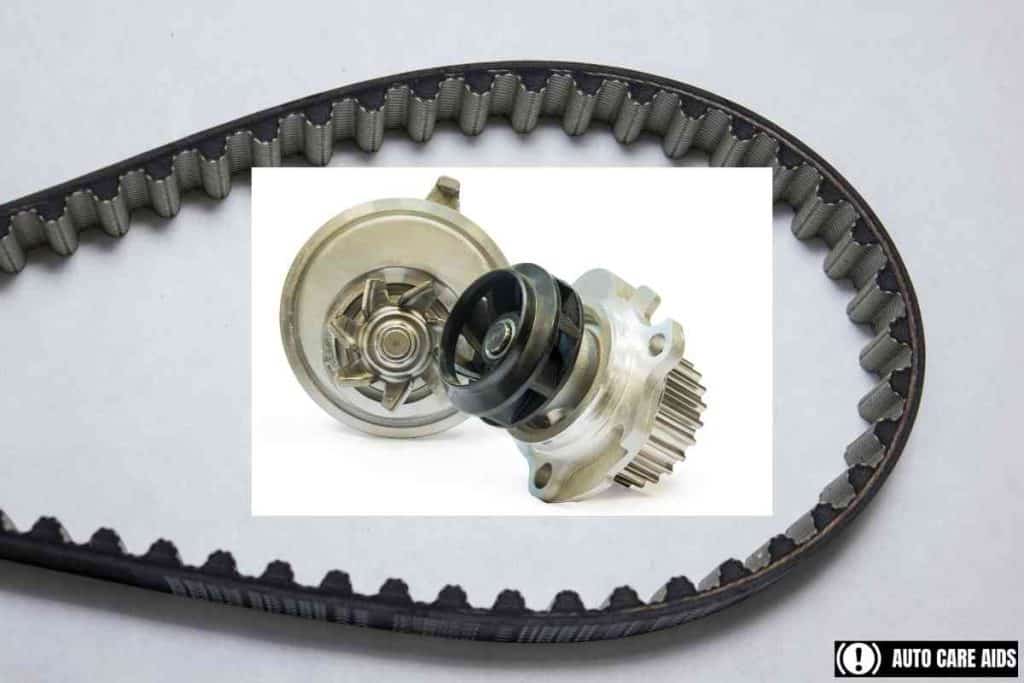Cost To Change Water Pump And Timing Belt

The simultaneous replacement of the water pump and timing belt is a common, and often necessary, maintenance procedure on many modern vehicles. Understanding the costs associated with this service can save you from unexpected expenses and ensure your engine runs smoothly for years to come. This article delves into the intricacies of this vital repair, providing insights for enthusiasts, owners, and professionals alike.
Why Replace Them Together?
The primary reason for replacing the water pump and timing belt concurrently lies in their often-shared location and the labor involved. On many engines, the timing belt drives the water pump. This means that accessing the water pump requires removing the timing belt. Since the timing belt is already exposed, it makes economic sense to replace it at the same time, even if it's not showing immediate signs of wear. A failing timing belt can cause catastrophic engine damage, while a leaking water pump can lead to overheating and subsequent engine failure. Replacing them together mitigates both risks and reduces future labor costs.
Factors Affecting the Cost
The cost of replacing the water pump and timing belt varies significantly based on several factors:
- Vehicle Make and Model: Luxury vehicles and high-performance cars often have more complex engine designs, requiring specialized tools and increased labor time. Parts for these vehicles are also generally more expensive. For instance, a BMW or Audi will likely cost more to repair than a Honda or Toyota.
- Engine Type: The engine configuration plays a crucial role. Replacing the water pump and timing belt on a V6 engine is typically more labor-intensive than on an inline four-cylinder (I4) engine due to the increased complexity and space constraints.
- Parts Quality: Choosing between OEM (Original Equipment Manufacturer) and aftermarket parts will impact the overall cost. OEM parts are generally more expensive but offer guaranteed fit and performance. Aftermarket parts can be more affordable, but quality can vary significantly. Opting for reputable aftermarket brands is advisable.
- Labor Rates: Labor rates vary depending on the geographic location and the type of repair shop. Dealerships usually charge higher labor rates than independent mechanics.
- Additional Components: It's often recommended to replace other related components, such as the timing belt tensioner and idler pulleys, during this service. These components are subject to wear and can cause premature timing belt failure if not replaced. Some kits even include a new thermostat which is a cheap part and worthwhile replacement while the system is drained.
Estimating the Cost: A Breakdown
To provide a general estimate, the total cost to replace the water pump and timing belt typically falls within the range of $500 to $1500. This includes both parts and labor. Here's a breakdown:
- Parts: $200 - $600 (Timing belt kit including water pump, tensioner, and idler pulleys)
- Labor: $300 - $900 (depending on the complexity and hourly rate)
For example, a Honda Civic with an I4 engine might cost around $600 - $900, while a BMW 3 Series with a V6 engine could easily exceed $1200. Always obtain quotes from multiple repair shops to compare prices and services offered.
DIY vs. Professional Installation
While replacing the water pump and timing belt is technically possible as a DIY project, it's not recommended for inexperienced mechanics. This is a complex and precise procedure that requires specialized tools, a thorough understanding of engine mechanics, and the ability to properly align the timing marks. Incorrect installation can lead to severe engine damage. Unless you have extensive experience and the necessary tools, it's best to entrust this repair to a qualified mechanic. If you incorrectly time the engine when replacing the belt, the pistons can collide with the valves, causing extensive and very expensive damage.
Long-Term Benefits
Investing in the timely replacement of the water pump and timing belt is an investment in the longevity and reliability of your engine. Regular maintenance prevents costly breakdowns and ensures optimal engine performance. Consult your vehicle's owner's manual for recommended service intervals and don't hesitate to seek professional advice from a trusted mechanic.
